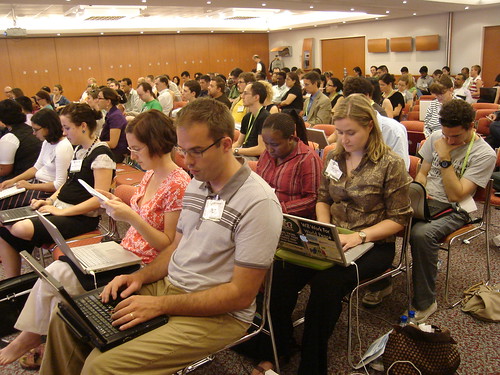Nicholas Carr’s well crafted piece in The Atlantic seems to be suggesting a fate far less neutral, and in particular, if the title is to be believed, “Is Google making us stupid?”.
After several (unsurprising) anecdotal paragraphs about no longer being able to read lengthy material without fidgeting and pleasant detour noting a recent study suggesting that people are prone to skimming lengthy material, Carr arrives at Maryanne Wolf–a developmental psychologist at Tufts University and the author of Proust and the Squid: The Story and Science of the Reading Brain—to voice one of his primary points: “we are how we read.”
Carr loses me when that point becomes “we are how we read, and how we read thanks to the Internet lends a diminished capability of deep thinking,” but the progression between the premises and the conclusion are nonetheless worthwhile because it provides an interesting description of why different media of communication may breed different mental processes.
According to Wolf, “[reading], is not an instinctive skill for human beings….We have to teach our minds how to translate the symbolic characters we see into the language we understand. And the media or other technologies we use in learning and practicing the craft of reading play an important part in shaping the neural circuits inside our brains.” For example, “Experiments [that] demonstrate that readers of ideograms, such as the Chinese, develop a mental circuitry for reading that is very different from the circuitry found in those of us whose written language employs an alphabet.”
Carr further bolsters his argument by pointing out that “the human brain is almost infinitely malleable”; according to James Olds, a professor of neuroscience who directs the Krasnow Institute for Advanced Study at George Mason University, “‘[the brain] has the ability to reprogram itself on the fly, altering the way it functions.’”
So “when the Net absorbs a medium…[and] injects the medium’s content with hyperlinks, blinking ads, and other digital gewgaws, and it surrounds the content with the content of all the other media it has absorbed….The result is to scatter our attention and diffuse our concentration.”
Perhaps that’s true, but it doesn’t follow that by putting “efficiency” and “immediacy” above all else”, the Internet “may be” (re)programming us to be “mere decoders of information” and diminishing our ability “to make the rich mental connections that form when we read deeply and without distraction, remains largely disengaged.” (a point made by Carr through Wolf)
Carr concedes that “[we] should be skeptical of [his skepticism],” noting Socrates hostility toward the development of writing and the hostility centuries later toward the development of the printing press. The concession, however, is only halfhearted, and he retracts it rather quickly, suggesting that “the Net isn’t the alphabet, and although it may replace the printing press, it produces something altogether different.” That something different, according to Carr, is a diminished ability to perform “deep reading.” And we should be worried because “the kind of deep reading that a sequence of printed pages promotes is valuable not just for the knowledge we acquire from the author’s words but for the intellectual vibrations those words set off within our own minds.”
The elegance of the sentence is nearly enough to make one believe, but I have a hard time “decoding” what exactly Carr means or is suggesting happens during deep reading. In particular, it is difficult to read that paragraph without wondering if Carr means to imply that “the intellectual vibrations” are separable, or aren’t directly linked to the attainment of knowledge, as if the process of going through a physics theorem until the process described is actually understood doesn’t produce the reverberations Carr appears to be referring to.
Perhaps the problem is that we have not become mere decoders, but creatures that don’t even have the patience to decode, that don’t have the discipline to read through a lengthy piece so as to actually attain that knowledge. That would be a legitimate concern, although it’s unclear to me that the “ethic” of the Internet—if it has one–promotes intellectual laziness.



 Click Here
Click Here